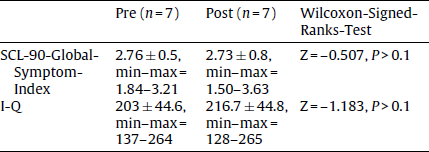Table 1 Scale scores before and after the SST.

Published online by Cambridge University Press: 23 March 2020
Social skills training (SST) is an element of cognitive-behavioral therapy, which focuses to improve verbal-nonverbal behaviors involved in social interactions.
To assess the effectiveness of a standardised 8–sessions-SST-group therapy (Hinsch&Pfingsten) in Türkish Immigrants who have anxiety/depressive disorders.
German-Turkish transations-backtranslations of contents and materials of the standardised 8–sessions-SST-group therapy were performed. These weekly eight group sessions applied by two Turkish-psychotherapists to 8 voluntary Turkish-Immigrants (F/M = 4/4, age = 50 ± 5.4), who were in treatment for anxiety/depressive disorders in our transcultural outpatient-clinic in Hannover, Germany. Symtom-Checklist-90 (SCL-90) and Insecurity Questionnaire (I-Q) administered before and after the treatment programm. Seven patients completed pre-post scales.
Table 1 presents the scale scores. There was no significant improvement in global-symptom-severity and insecurity-profiles after the SST. One of the psychotherapists and one of the patients were interviewed to discuss qualitatively possible reasons of that.
I think patients were not comfortable with many pencil-paper homeworks. Daily-life-examples were too close to German culture. Therefore it's crucial to culturally modify the sessions.
I found the sessions-homeworks strict and different from my thinking style and culture.
Qualitative data of this study stated that no improvement may be caused by eurocentristic nature of the psychotherapeutic approach. Berry (2006) suggested that such interventions may generate/exacerbate acculturative-stress and may not be beneficial for the patient. Further studies should investigate effectiveness of culturally-modified SST in Turkish immigrants.
The authors have not supplied their declaration of competing interest.
Table 1 Scale scores before and after the SST.


Table 1 Scale scores before and after the SST.
Comments
No Comments have been published for this article.